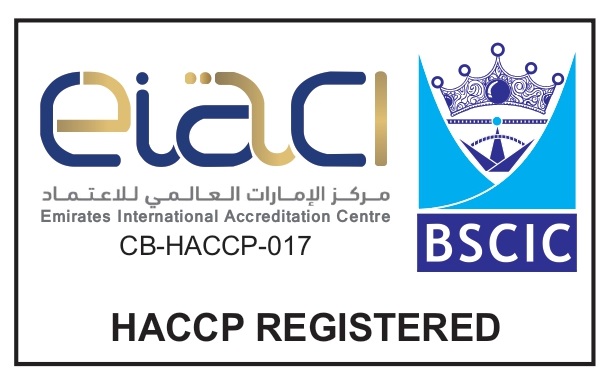This ISO Management System will be accredited by EIAC
(Emirates International Accreditation Center)
 What Is HACCP?
What Is HACCP?
Other names for HACCP include HAZARD ANALYSIS CRITICAL CONTROL. It mainly functions as a management system (based on a methodical and scientific approach) for identifying and addressing particular hazards in order to maintain the safety of food. It is a hazard assessment tool that enables the creation of PRPs (Pre-requisite Programmes), OPRPs (Operational Pre-requisite Programmes), and CCPs (Critical Control Points).
NEED of HACCP
Needs of Hazard Analysis Critical Control Point is mentioned below-
- It Identified the specific hazard which can occur in the food production or in food chain.
- It helps to control the hazardous risk which can cause major illness to consumer such as physical, Biological, and chemical hazard.
- It gives a systematic procedure which enable a FBO to produce safe food.
- It is type of preventive measures which helps to control the hazard whose occurrence is natural in the food contributed by environment or at time of food processing.

Benefits of HACCP
The Benefits of implementation of HACCP system are given below-
- It helps to produce safe food for consumption with properly organize systematic approach and process.
- Throughout the Food Chain it effectively manages the risk which can occur naturally by environment or by mishandling.
- Food safety hazard control which is recognized Internationally can be established and implemented.
- As it is preventive measure it saves the money and help the business to grow more effectively.
- It fulfils the regulatory requirement for the Food safety management by ensuring the compliant with law. And by offering due diligence defense in the court.
Is it complex to implement HACCP?
HACCP system implementation is complicate, and it requires many hurdles which consist of technical knowledge and expertise, different categories of Product and resources availability. It is explained below-
- Technical knowledge and expertise- The basic knowledge of Food processing area is mandatory to recognize or identifies the Food safety Hazard. The knowledge of Food safety and its required play essential role at the of developing the HACCP System in food industry (FBOs).
- The development HACCP program its training is required to aware the FST. FST consist of people from different area (eg: management, maintenance, production).
- Different types of Products-As the variety of product increases the additional HACCP Study need to be develop for ensuring food safety Hazards. Single HACCP plan cannot be used for all the products . It is responsibility of HACCP team to categories the product which have similarities in processing system and type.
- Availability of Resources and Funds- For small and medium food processing industry or company mostly this issue occurs where limited fund and resources effect the implementation of the HACCP system.
For initial installation or implementation of HACCP system requires resources and Fund. For Creating workplan and its implementation of food safety system training is required for newly developed HACCP team.
Defined Principles of HACCP
It consists of 7 principles which are mentioned below-
PRINCIPLE 1 - Conduct a hazard analysis.
PRINCIPLE 2 - Determine the Critical Control Points (CCPs).
PRINCIPLE 3 - Establish critical limit(s).
PRINCIPLE 4 - Establish CCP monitoring requirements
PRINCIPLE 5 - Establish corrective actions
PRINCIPLE 6 - Establish effective recordkeeping procedures
PRINCIPLE 7 - Establish procedures for verifying.
